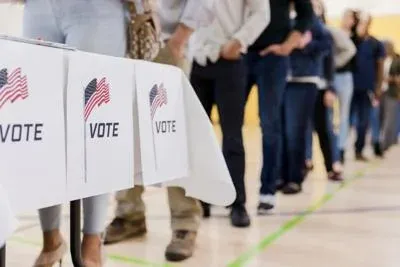Type Of Elections
General Election
A general election is an election to determine who takes office for the national, state, county, or district office.
Special Election
A special election is an election called by the Governor of Florida for the purpose of electing a party nominee to be voted on in a General or Special General Election.
Primary Election
A primary election is an election for the purpose of nominating a party nominee to be voted for in the General Election to fill a national, state, county, or district office.
Presidential Preference Primary
The Presidential Preference Primary is an election for the purpose of nominating a party nominee for President of the United States.
Florida's Closed Primary System
Florida is a closed primary state, which means that only voters who are registered members of a political party may vote for their respective party's candidates in a primary election.
Voters without party affiliation are not eligible to vote for party candidates in a primary election. The exception to this is the Universal Primary Contest.

Closed Primary Voting Scenarios:
1. Jack is a registered republican. Jack's ballot will include republican seats, non-partisan seats, and any local initiatives or constitutional amendments.
2. Jill is a registered democrat. Jill's ballot will have democratic seats, non-partisan seats, and any local initiatives or constitutional amendments.
3. Alice is registered without a party affiliation. Alice's ballot will have only non-partisan seats, and any local initiatives or constitutional amendments.
4. Richard is registered with a minor party. Richard’s ballot will have non-partisan seats, and any local initiatives or constitutional amendments., unless his registered minor party has two candidates running for a partisan seat.
Non-partisan judicial, non-partisan school board offices, non-partisan special districts, and municipal and local referenda questions are included in some primary elections. All registered voters, including those without party affiliation are entitled to receive and vote these ballots.
Universal Primary Contest
In a primary election, if there is a partisan race where all the candidates that qualified to run were of the same party affiliation and the winner will have no opposition in the general election then there is a Universal Primary Contest. This means all qualified electors, regardless of party affiliation, may vote in the primary election for that office. The candidates receiving the highest number of votes cast in the primary election shall be declared the winner to such office. This means their name and office will not appear on the general election ballot.
Example:
Qualified Candidate A -- DEM
Qualified Candidate B -- DEM
(No other candidates qualified for this office, therefore there will be no opposition in the general election.)
The winner will be determined on the primary election ballot where all voters regardless of their registered party affiliation will vote on the candidates for that contest.
Non-Partisan Offices
After candidate qualifying ends, non-partisan offices are designated for either the primary election ballot or the general election ballot.
School board, judicial offices and the Ponte Vedra Beach Municipal Service District are the only non-partisan races that appear on the primary ballot regardless of the number of candidates (two or more). If one candidate receives 50% + 1 of the votes he or she wins. If no candidate receives 50% + 1 of the votes then the two candidates who received the highest numbers will face off in the general election.
Elections for the City of St. Augustine and the City of St. Augustine Beach municipal offices begin in the primary election only if there are more than two qualified candidates. If one candidate receives 50% + 1 of the votes he or she wins. If no candidate receives 50% + 1 of the votes then the two candidates who received the highest numbers will face off in the general election. If only two candidates qualified for these municipal offices they appear only on the general election ballot.
All other Special District offices and Community Development Districts with two or more qualified candidates will appear only on the general election ballot.

